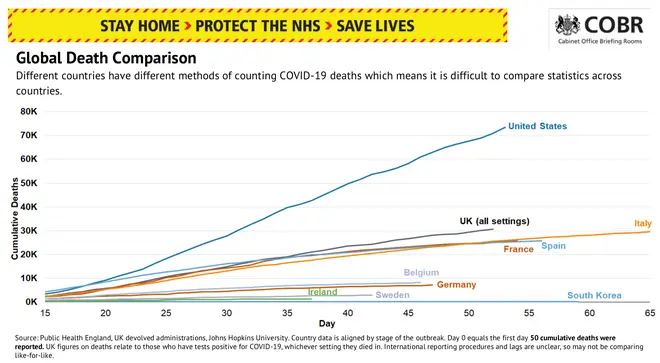
Ian Payne 4am - 7am
7 May 2020, 20:35 | Updated: 7 May 2020, 20:54

David Spiegelhalter on daily briefing graphs
Statistician David Spiegelhalter, who has been cited by Boris Johnson himself, tells LBC why the government's daily briefing graphs are unhelpful and recommends different data for the public to refer to.
"I really don't like the slides they put up, the curves going up the different countries, those are unbelievably difficult to interpret because until yesterday they weren't even corrected for how many cases per million were there.
"It's hopeless to compare huge countries with small countries," he said, "to be honest, the slides they put up at those press conferences, I don't think the public are very well served by those."
Eddie asked what data the public could referring to and Mr Spiegelhalter recommended the data collected by NHS England on the actual day on which people died in hospitals.
"That is a very smooth curve which shows clearly a peak on April 8, that's when the epidemic deaths peaked in the English hospitals, and then it's steadily declining, we get a good picture with that.

"It would be quite good to see cases per million on a scale but in order just to see the broad clustering of different groups. I think we can see that we're in a top group and others are in a bottom group...we can make the comparisons between the top and the bottom and that's a fair thing to do," Mr Spiegelhalter said.
He commended the government's support of the Office of National Statistics that are doing a "fantastic" job of collecting and analysing data which is just openly available for anyone to look at.
"They're doing new analyses just today on ethnicity showing that black and ethnic groups are having about twice the death rate from Covid-19, even allowing for where they lived and the population density," he said.
He also added that we are "finally" going to get a survey about who has got the infection in the country.
"It is quite extraordinary that we're only just finding that out now. That's not ONS's fault, it's just been revealed at a Parliamentary inquiry that they weren't asked to do that until April 17 so we're finally going to find out how many people have got it and maybe even how many people have had it."